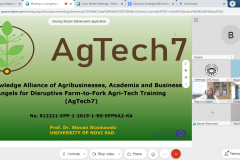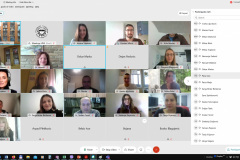Deep Dive Workshop – Serbia
December 2, 2020
On November 25th, 2020 a Deep Dive Workshop was organised in Serbia by the University of Novi Sad together with BIOSENSE Institute. The workshop is related to the creation of two course modules in the agtech domain foreseen by the Project:
- Data Analytics in Farm Management Information Systems (being developed by BIOSENSE Institute, University of Novi Sad) and
- Artificial Intelligence in supply chain optimisation (being developed by Faculty of Technical Sciences, University of Novi Sad).
The workshop of the workshop was attended by nearly 50 participants including students, teaching staff and researchers from Faculty of Agriculture, Faculty of Technology and Faculty of Technical Sciences, researchers from the BIOSENSE Institute, representatives from startup companies, business angels, agribusiness entrepreneurs, business incubators.
Both presenters described briefly the structure of the modules, main objectives and expected outcomes with accompanying case studies. The presentations were followed by questions and discussions among the workshop participants which main conclusions were:
- the participants found the modules extremely useful, especially in the agriculture, thus they proposed these courses to be made available for students at doctoral studies, thus evaluated by ECTS
- policy makers should take into consideration the mechanisms for accelerating the process of agriculture transformation due to the aging population and their educational background, so as a concrete financial result of specific technology application could be visible
- it is suggested the target groups for these courses to be defined more precisely so as the outcomes would be more efficient and the course attenders equipped with skills required for problem solving in agriculture
- presented smart technologies in agriculture should be user friendly and available for most of their users in agriculture.
Participants feedback is perceived as an important contribution towards further module content development, taking into account diverse knowledge, experience and background of the workshop participants. Once finalised, the two modules will be integrated into comprehensive AgTec7 curriculum consisting of seven Agri-tech learning modules.
Upon finalisation of the curriculum content, modules will be put to test in the form of face to face training deployments and one online MOOC style e-learning platform with open access.
Many thanks go to all the participants! We look forward to continuing cooperation.
AgTech7 Project Coordination Team



